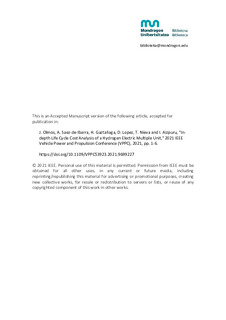Title
In-depth Life Cycle Cost Analysis of a Hydrogen Electric Multiple UnitAuthor
Author (from another institution)
Research Group
Almacenamiento de energíaSistemas electrónicos de potencia aplicados al control de la energía eléctrica
Other institutions
IkerlanConstrucciones y Auxiliar de Ferrocarriles (CAF)
Version
Postprint
Rights
© 2021 IEEEAccess
Open accessPublisher’s version
https://doi.org/10.1109/VPPC53923.2021.9699227Published at
2021 IEEE Vehicle Power and Propulsion Conference (VPPC) 25-28 de Octubre 2021Publisher
IEEEKeywords
lithium-ion batteries
Sensitivity analysis
Hydrogen
Fuel cells ... [+]
Sensitivity analysis
Hydrogen
Fuel cells ... [+]
lithium-ion batteries
Sensitivity analysis
Hydrogen
Fuel cells
Propulsion
Rail transportation
Fuels [-]
Sensitivity analysis
Hydrogen
Fuel cells
Propulsion
Rail transportation
Fuels [-]
Abstract
This paper analyses the life cycle costs of railway projects involving hydrogen electric multiple units. The analysis focuses on the interrelation between the selected lithium-ion battery technology, ... [+]
This paper analyses the life cycle costs of railway projects involving hydrogen electric multiple units. The analysis focuses on the interrelation between the selected lithium-ion battery technology, the designed energy management strategy, and the fuel cell and battery sizes. In particular, 3 lithium-ion battery technologies and 4 strategies are proposed, leading to a sensitivity analysis composed of 12 cases. For each case, an approach for the optimal sizing of the fuel cell and battery is proposed. A scenario based on a real railway line is introduced and the obtained results are compared with the performance of a traditional diesel-electric multiple unit. The results show that a reduction of the hydrogen price is required so as the hydrogen-based option becomes competitive compared to the diesel-based one. The best result of the sensitivity analysis is obtained with an off-line optimization-based strategy and LTO batteries. [-]






















